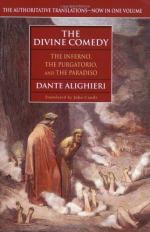Was wont to boast two suns, whose several beams
Cast light on either way, the world’s and God’s.
One since hath quench’d the other; and the sword
Is grafted on the crook; and so conjoin’d
Each must perforce decline to worse, unaw’d
By fear of other. If thou doubt me, mark
The blade: each herb is judg’d of by its seed.
That land, through which Adice and the Po
Their waters roll, was once the residence
Of courtesy and velour, ere the day,
That frown’d on Frederick; now secure may pass
Those limits, whosoe’er hath left, for shame,
To talk with good men, or come near their haunts.
Three aged ones are still found there, in whom
The old time chides the new: these deem it long
Ere God restore them to a better world:
The good Gherardo, of Palazzo he
Conrad, and Guido of Castello, nam’d
In Gallic phrase more fitly the plain Lombard.
On this at last conclude. The church of Rome,
Mixing two governments that ill assort,
Hath miss’d her footing, fall’n into the mire,
And there herself and burden much defil’d.”
“O Marco!” I replied, shine arguments
Convince me: and the cause I now discern
Why of the heritage no portion came
To Levi’s offspring. But resolve me this
Who that Gherardo is, that as thou sayst
Is left a sample of the perish’d race,
And for rebuke to this untoward age?”
“Either thy words,” said he, “deceive;
or else
Are meant to try me; that thou, speaking Tuscan,
Appear’st not to have heard of good Gherado;
The sole addition that, by which I know him;
Unless I borrow’d from his daughter Gaia
Another name to grace him. God be with you.
I bear you company no more. Behold
The dawn with white ray glimm’ring through the
mist.
I must away—the angel comes—ere
he
Appear.” He said, and would not hear me
more.
CANTO XVII
Call to remembrance, reader, if thou e’er
Hast, on a mountain top, been ta’en by cloud,
Through which thou saw’st no better, than the
mole
Doth through opacous membrane; then, whene’er
The wat’ry vapours dense began to melt
Into thin air, how faintly the sun’s sphere
Seem’d wading through them; so thy nimble thought
May image, how at first I re-beheld
The sun, that bedward now his couch o’erhung.
Thus with my leader’s feet still equaling pace
From forth that cloud I came, when now expir’d
The parting beams from off the nether shores.
O quick and forgetive power! that sometimes dost
So rob us of ourselves, we take no mark
Though round about us thousand trumpets clang!
What moves thee, if the senses stir not? Light
Kindled in heav’n, spontaneous, self-inform’d,
Or likelier gliding down with swift illapse
By will divine. Portray’d before me came
The traces of her dire impiety,
Whose form was chang’d into the bird, that most
Delights itself in song: and here my mind
Was inwardly so wrapt, it gave no place
To aught that ask’d admittance from without.




